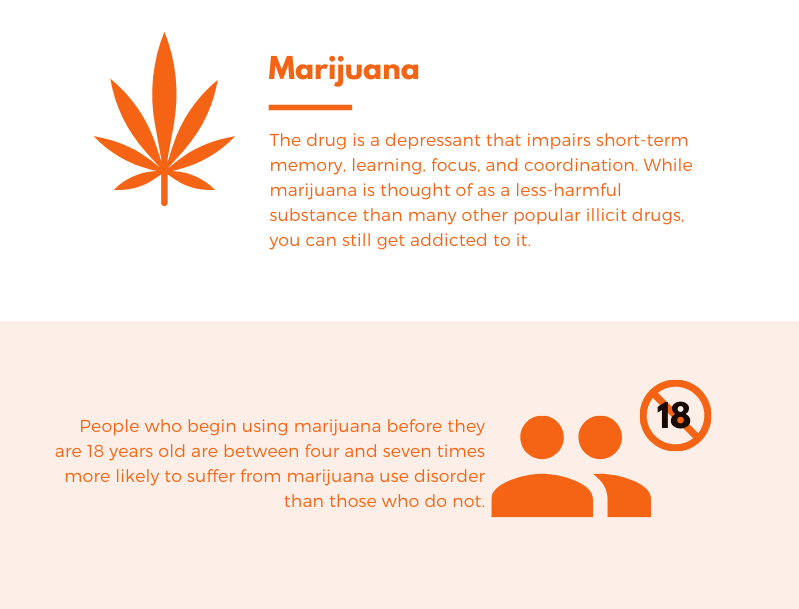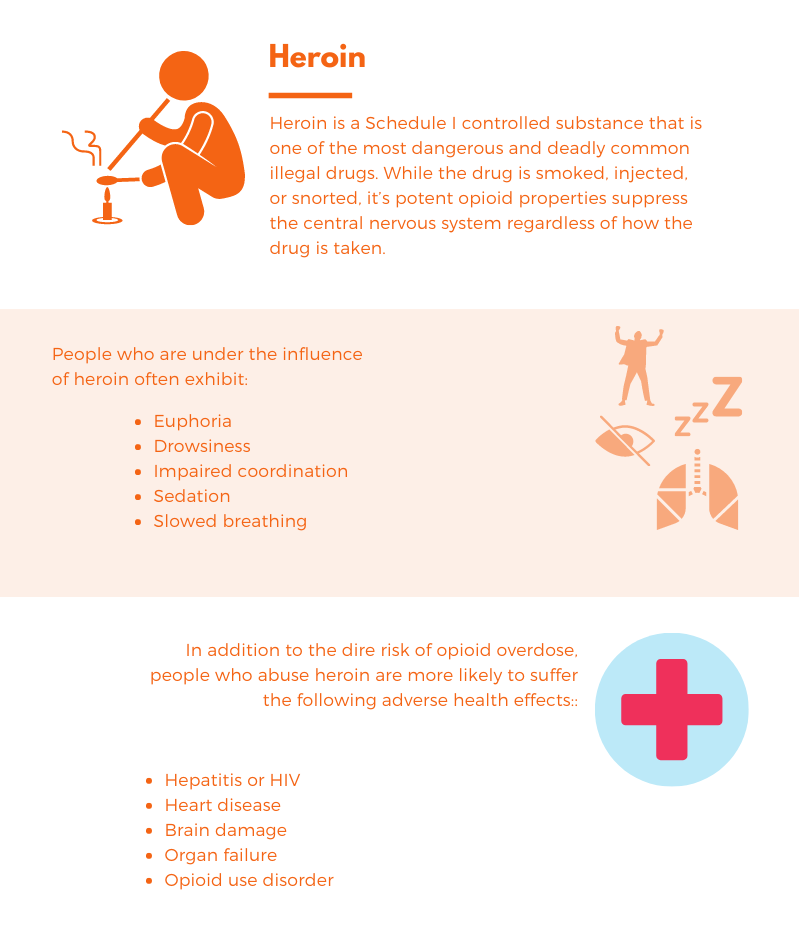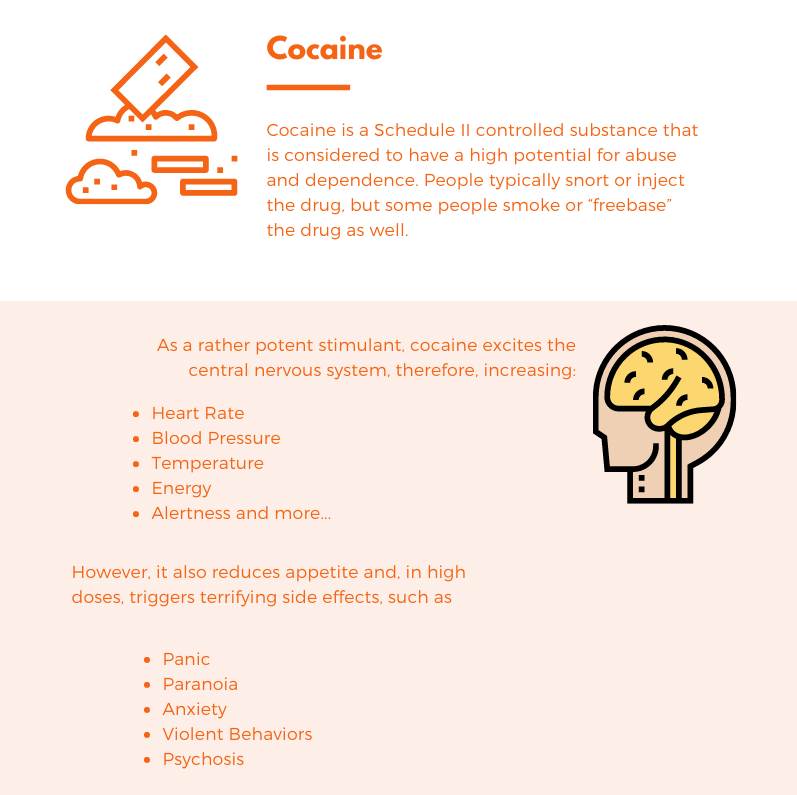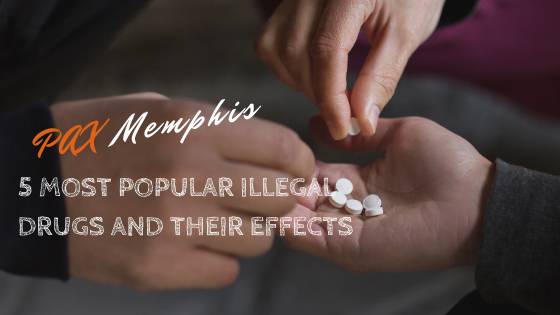There are many popular illegal drugs that people abuse and become addicted to. Sadly, most of these drugs have devastating side effects on the mind and body. After all, they are considered controlled substances for a reason.
Not only are many of the most common illicit drugs highly addictive, but they pose serious health risks – including, but not limited to, blood-borne illnesses, malnutrition, cognitive decline, fatal overdose, and more. Furthermore, experts estimate that 31.9 million Americans aged 12 and older abuse some kind of illegal drug every month. What’s more, is that 50% of people abuse illicit substances or engage in nonmedical use of prescription drugs at some point in their lives.[1]
While prescription drug abuse is illegal and is responsible for a large part of illicit substance abuse in the United States, this article focuses on schedule I and II drugs that are the most popular in the nation and commonly sold on the street. These addictive substances all have little to no medical use and carry a significantly high risk of abuse. Plus, thousands of afflicted people seek addiction treatment for these most commonly abused illegal drugs each and every year.
Top 5 Most Common Illegal Drugs and Their Effects
While the opioid epidemic rages on, the National Survey on Drug Use and Health (NSDUH) shows that rates of illicit drug use have increased in recent years.[2][3] Here are 6 of the most commonly abused illegal substances in the nation and the potential threats they pose to a person’s health.
Marijuana
By far, the most commonly abused illegal drug is marijuana. Although an increasing number of states and municipalities have begun legalizing both medicinal and recreational marijuana, the drug is still illegal on a federal level and is considered a Schedule I controlled substance by the Drug Enforcement Administration (DEA). Despite the increasing recognition for the medicinal application of marijuana, many people abuse the drug for its short-term high.

Heroin
Heroin is a Schedule I controlled substance that is one of the most dangerous and deadly common illegal drugs. While the drug is smoked, injected, or snorted, it’s potent opioid properties suppress the central nervous system regardless of how the drug is taken. Although heroin is derived from the poppy plant and acts on the brain like morphine, it is highly addictive and is responsible for nearly 15,000 fatal overdoses each year.[5]

Cocaine
Cocaine is a Schedule II controlled substance that is considered to have a high potential for abuse and dependence. People typically snort or inject the drug, but some people smoke or “freebase” the drug as well. This dangerous, popular illegal drug is commonly used in nightclubs, at parties and social events, or to help people stay awake or boost their focus. Furthermore, polydrug use is fairly common with cocaine – exacerbating the risk for devastating and fatal health complications.

Methamphetamine
Methamphetamine, also known as meth or ice, is an even stronger stimulant than cocaine. As a Schedule II controlled substance, the DEA recognizes the high potential for abuse, addiction, and dangers associated with this popular drug. Like other stimulants, meth increases energy and alertness, allowing users to stay awake for hours, and even days, on end. It’s also known to make people feel invincible – increasing the risk of someone putting their own lives in danger and engaging in risky behaviors.
The extended energy and extreme euphoria that meth provides users with doesn’t come without a price. The high is typically followed by a “crash”, where users experience depression, fatigue, irritability, cravings, and even suicidal thinking. The illicit drug is also known to lead to tooth decay, severe weight loss, cardiac arrest, skin sores, mental health conditions, and drug addiction.
MDMA (Ecstasy)
MDMA, also known as Ecstasy or Molly, is usually sold in powder, pill, or tablet form that people swallow and ingest or snort. This illegal drug has become more common over the years due to raves and concerts where young adults take the drug for its euphoric effects. People who abuse MDMA typically feel a closeness or connection to others along with an increased heart rate, dilated pupils, increased sweating, and more.
Despite the popularity of this illegal drug, there are many serious health concerns regarding the use of it. Many people take ecstasy while they are dancing or partying, so there is an immediate risk of dehydration. The drug also impairs one’s inhibitions, so there is also a risk of dangerous and harmful behaviors or unsafe sex. In the long term, MDMA abuse usually leads to impaired memory, addiction, sleep problems, depression, anxiety, and more.
Are You Addicted to One of the Most Common Illegal Drugs?
Do you have a hard time controlling how much or how often you abuse a substance? Or, do you experience withdrawal symptoms when you try to get sober? If so, you might be addicted.
Addiction is scary and comes at a high cost. It can affect your health, social life, family, career, and overall wellbeing. Fortunately, millions of people have overcome addiction by seeing help from a drug rehab near them.
If you or a loved one needs help getting sober, contact us today to see how we can assist you.
References:
- https://www.verywellmind.com/rates-of-illicit-drug-abuse-in-the-us-67027
- https://nsduhweb.rti.org/respweb/homepage.cfm
- https://www.dea.gov/drug-scheduling
- https://www.drugabuse.gov/publications/media-guide/most-commonly-used-addictive-drugs
- https://www.drugabuse.gov/related-topics/trends-statistics/overdose-death-rates
Medically Reviewed: September 25, 2019

All of the information on this page has been reviewed and verified by a certified addiction professional.










